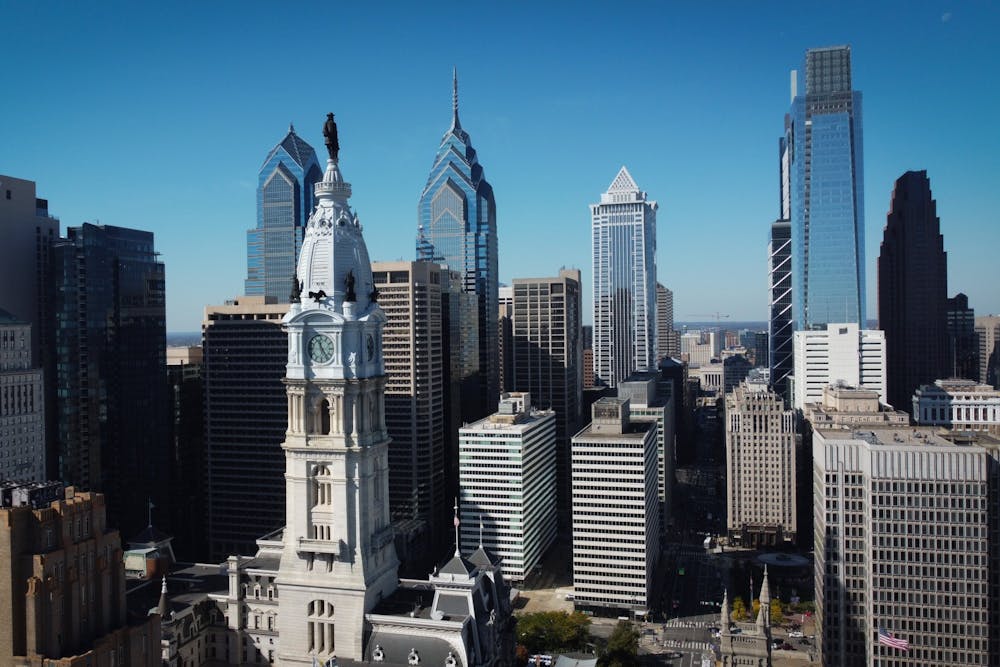
The American Dream. It’s a phrase we all know well, a cornerstone of social and political discourse. Many of us here at Penn are trying to pursue it. Whether we pour scorn on the idea, or have faith in its promise, there is no disputing its emotional power.
The American Dream has proven an indispensable tool in building the American national ethos. Yet its political effects are arguably more important, buttressing allegiance to a highly successful, capitalist economic model. The idea that one can achieve upward mobility through perseverance and energy, in a society with few barriers, is individualistic and thus hostile to state intervention. It’s no wonder that, in recent years, Republicans have been far more comfortable using the term than Democrats. Ronald Reagan and George H.W. Bush underscored the American Dream as a creed of self-reliance, family values and plucky entrepreneurialism.
American Dream mythology is closely tied to the middle-class and small business. The public does not associate the dream with ‘becoming wealthy,’ instead citing goals associated with the middle-class, such as retiring comfortably and owning a home. This makes sense, considering the prize at stake; the U.S. middle-class is the most prosperous of any large Western country.
Yet there is a hole at the heart of this ethic. The American Dream tells us about the values of those who seek upward mobility, and little about those that actually deliver material prosperity. If we are to wax lyrical about the spirited individual, then we must also celebrate the modern midwives of success: the large, sprawling corporation.
Increasingly, large firms produce the steady jobs people rely on. According to Census Bureau data, almost 40% of Americans work for companies with more than 2,500 employees, and are more likely to work for a large firm than a small one. Think about how many Penn students are eager to land jobs at Google and Goldman Sachs. However, at the same time, only 21% of Americans have ‘a lot of confidence’ in big business; 53% hold a negative view, up from 39% in 2012.
Businesses are far from perfect. Their collective reputation has been tarnished by several high-profile corporate scandals, such as Enron’s collapse and Facebook’s data leaks. Critics point out that corporations pollute the environment, and may neglect to provide proper pay and workplace conditions. Large financial institutions, acting irresponsibly, played a major role in tanking the economy in 2008.
Yet the overall picture is positive. Corporations’ adverse impact on the environment simply reflects their disproportionate share of global production. Big business is now leading the fight to mitigate climate change. Over 5,200 businesses, representing 40% of the world’s private capital, have now pledged to meet net-zero targets by 2050. Big firms also provide better paid and more secure jobs, invest more in R&D than small firms, and are overall more productive, driving technological and economic growth. For example, the financial and insurance sectors are the leading contributors to real GDP growth in 24 states. Big businesses also supply smaller outfits — an independent pharmacy needs to buy drugs from somewhere. We cannot understate their vital role to U.S. economic prosperity.
Given their importance, we need to develop a positive message about big business, or else risk their demise at the hands of high taxes, overbearing regulation and stringent union laws. It is not enough to just celebrate small outfits. Ironically, The American Dream’s focus on gutsy individualism can put it morally at odds with establishment companies, even though the clearest way to achieve the Dream is through their steady employment.
Sure, we can cite statistics about social mobility, but the American Dream’s appeal is fundamentally emotional. It is an optimistic, moving force. The opportunity to live with dignity, to attain freedom, to live on your own terms, is a prospect that stirs the heart.
In the same way, we need an emotional defense of the big corporation. Talking about GDP alone will not cut it. Large corporations afford us opportunities to raise our children in secure, prosperous environments. They supply goods which keep our families safe and happy. They pay us well so we can afford a life of pride and self-respect, where we can pursue our hobbies with abandon. Becoming a ‘company man’ often results in career advancement and fulfilling one’s potential. More broadly, corporations export American soft power abroad, enhancing domestic security. Literature, music, and art are also far richer when responding to economic dynamism that corporations are crucial at producing.
Like everything in politics, the fundamental question has deep historical roots. Should we subscribe to a Jeffersonian view of the world, and celebrate the small, independent artisan, or should we follow Alexander Hamilton, and throw our weight behind established industry? I say that we can do both. There is an unexplored romantic case for big business, and I hope conservatives, who are rightly intent on defending free markets, make it more passionately. Penn students, often tarnished with the pejorative ‘corporate sellout,’ should wear the badge proudly.
Editor’s Note: This op-ed has been updated to include a different image in efforts to recognize that the original image, of Diego Rivera’s “Detroit Industry Murals,” reflects the Detroit industrial economy in the 1930s, which sparked protest against companies’ domination of workers and concerns about the ethical rights of the working class. The Daily Pennsylvanian regrets the use of Rivera’s work as the image representing this op-ed.
KEYVAN FARMANFARMAIAN is a College senior studying History from London, United Kingdom. His email is keyvanff@sas.upenn.edu.
The Daily Pennsylvanian is an independent, student-run newspaper. Please consider making a donation to support the coverage that shapes the University. Your generosity ensures a future of strong journalism at Penn.
Donate



